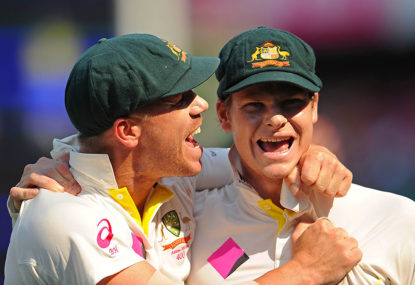Michael Clarke’s injury and the dumping of Peter Siddle has given Australia its youngest Test line-up in some time for the second Test against India.
Australia have six players aged 28 or younger in their team, after having relied so heavily upon veterans for the past few years.
Last summer, as the Australians demolished England 5-0, they famously went through the series with an unchanged line-up. It was a commendable feat. The worrying aspect was that the XI they fielded had an average age of 31.3.
Fast forward 12 months and Australia last week selected an almost identical side for the first Test against Adelaide. Only one change had been made to the all-conquering Ashes XI, with veteran batsman George Bailey having been replaced by 23-year-old all-rounder Mitch Marsh.
Australia hobbled over the line in that match in a manner reflective of the struggles of several of their veterans. The home side’s three most influential players for the match were 25-year-old Steve Smith, 27-year-old Nathan Lyon and 28-year-old David Warner.
Australia’s other young player, Marsh, made 81 runs for the match, including a breakneck 40 from 26 balls in the second dig which allowed Australia to make a crucial early declaration.
Meanwhile, six Australians in the twilight of their careers all laboured for various reasons. Chris Rogers and Brad Haddin, both 37, continued their concerning form troughs.
Paceman Ryan Harris, 35, picked up yet another injury in his first game back after a long layoff. Skipper Michael Clarke, 33, had his body fall apart again, casting doubt over his playing future.
Shane Watson, also 33 years old, looked decidedly out of nick with the bat and faces heavy pressure from blossoming fellow all-rounder Marsh.
And Peter Siddle may be only 30 years old but appears to be in the dying days of his Test career after 18 months of innocuous performances marked by a decided reduction in pace and penetration.
Siddle, Clarke and Harris will not play at Brisbane and there are no guarantees any of them will take part in next year’s Ashes, or any matches beyond that.
Rogers, Haddin and Watson, too, are at a juncture in their careers where it could all end very quickly. When players push well into their 30s it often ends in a hurry, either because of physical frailty or a sudden plummet in their performances.
That is why I have been saying for the past 18 months that Australia must begin to plan carefully for the future rather than pushing on and on with the same crop of veterans.
With Clarke forced out of the team by injury, Siddle by form and Harris by an ageing body, Australia’s experience and leadership has been eroded dramatically.
That means the selectors now are unlikely to want to drop veterans like Haddin, Rogers and Watson in the near future for fear of leaving the side too green.
Yet all three of those players, the first two in particular, should not be indispensable given their recent efforts. Haddin and Rogers, in particular, are wobbling and at 37 years old could be finished.
But the selectors are now all but forced to retain at least one of them, perhaps through to the next Ashes, because they cannot afford to lose too much experience too quickly.
After their veteran-heavy side defeated South Africa in March, Australia had the perfect time to move on from some of its old players and begin generational change.
Yet here we were last week with the same group of seven players whose age, health or form meant they probably wouldn’t last more than another 12 to 18 months – Haddin, Rogers, Clarke, Watson, Siddle, Harris and Mitch Johnson.
Johnson is the only one of those seven whose immediate future appears rosy. Australia must pray that at least four of the other six find a way to return to health or something close to their best form or the side will be in a massive hole heading into the Ashes in seven months’ time.
The last time Australia resisted generational change they unexpectedly lost veteran batsmen Mike Hussey and Ricky Ponting in a matter of weeks and then promptly went nine Tests without a win.
Change is again being forced upon them. They are better placed to adapt to it now, but further unforeseen occurrences could derail the side. If it does, the selectors will only have themselves to blame for their lack of foresight.





























































































